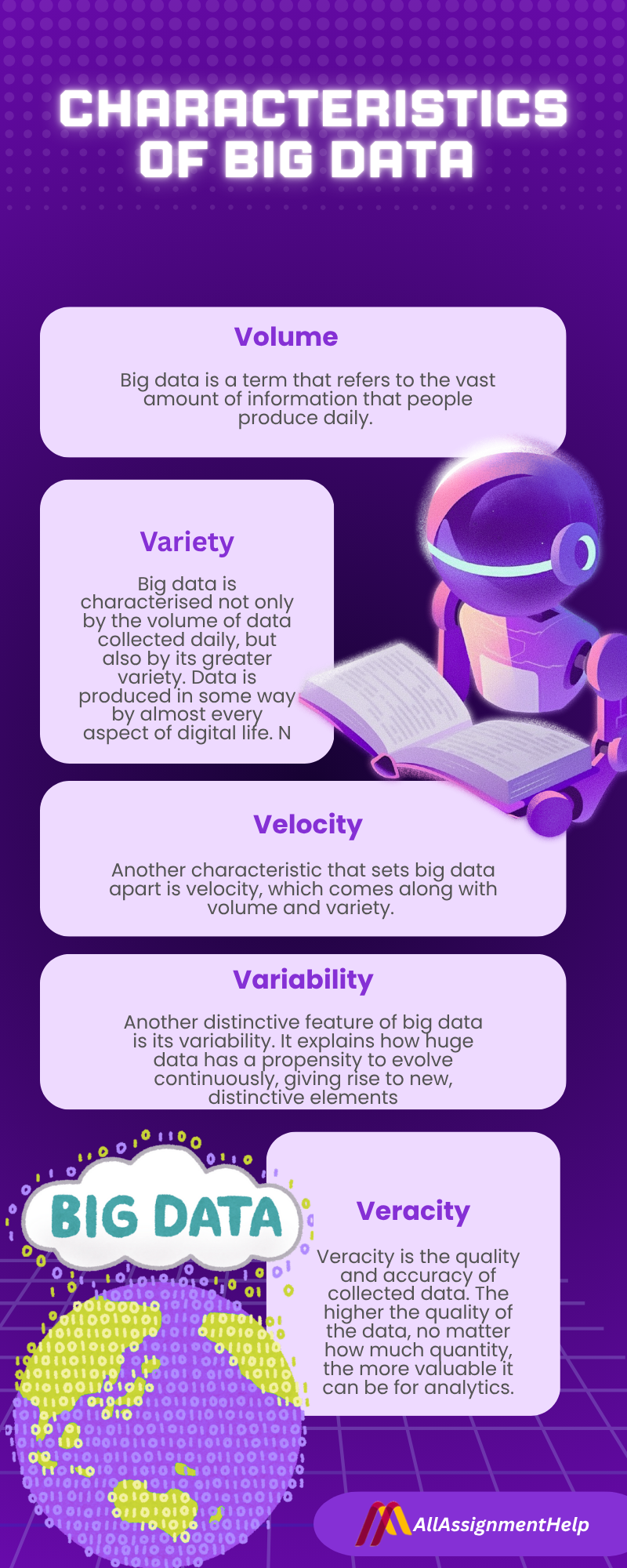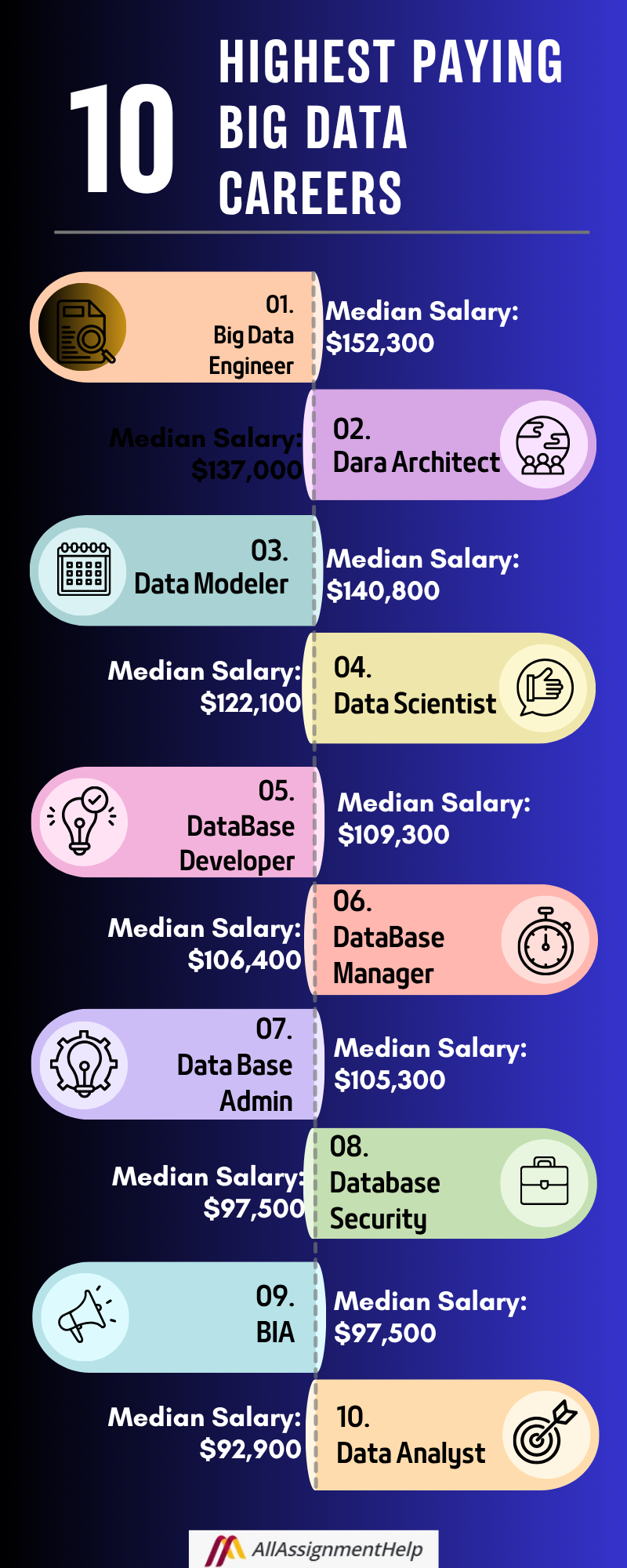Table of Contents
The field of big data has grown quickly as businesses use large, complicated databases to their advantage. Due to this expansion, there is a huge demand for big data careers, where experts convert unprocessed data into insights that can be used to drive innovation and gain a competitive edge. To handle and safeguard their data, many companies are searching for big data specialists with strong skill sets, and they are prepared to pay them well for their work. Sounds interesting?
To find out more about the many big data jobs that companies are looking to fill, continue reading this blog curated by allassignmenthelp.
What is Big Data?
The field of big data deals with enormous datasets that are too complicated to handle using conventional data management techniques. Companies use machine learning and predictive modelling approaches to mine both structured and unstructured data in order to get useful information. Managers can use these results to inform data-driven decisions that address important business issues.
To be successful in this field, one needs to learn several technical skills, including programming, data visualisation, data mining, and other analytics abilities. Since acquiring these abilities might be difficult, there is a growing demand for professionals in this industry, which makes working in big data a desirable career choice.
When you study something like big data, you have to prepare tons of assignments and tasks. It can be a difficult task for you to submit your assignments on time. If somehow you can manage to prepare the assignments timely, you may fall behind in your studies. But don’t worry, get online assignment help and manage to create the assignment with the help of experts without hampering your learning. It can be a great choice.
Read More: Tips And Tricks To Do Financial Accounting Assignment
Characteristics of Big Data
We must properly categorise everything to better our understanding. Five Vs can be used to describe the characteristics of big data: volume, variety, velocity, value, and veracity. These features not only help us understand big data, but they also show how to handle large, dispersed data at a manageable pace in a reasonable amount of time so that we can derive value from it, perform real-time analysis, and react quickly.
The five Vs are:

1. Volume
Big data is a term that refers to the vast amount of information that people produce daily. The amount of data that people produce daily is growing along with the global increase in digital engagement, as people embrace social networking, online shopping, and streaming videos and other material.
2. Variety
Big data is characterised not only by the volume of data collected daily, but also by its greater variety. Data is produced in some way by almost every aspect of digital life. Nowadays, almost every aspect of life is monitored and saved, from videos and posts on social media to customer information and medical records. Furthermore, data can be classified as unstructured, semi-structured, or structured. Whereas unstructured data is disorganised, akin to a deluge of images or films, structured data is a collection of organised data. In the middle is semi-structured data, which has categorising features but no strict framework.
3. Velocity
Another characteristic that sets big data apart is velocity, which comes along with volume and variety. Humans are producing data at previously unheard-of speeds because of smartphones and social media, before big data architecture.
4. Variability
Another distinctive feature of big data is its variability. It explains how huge data has a propensity to evolve continuously, giving rise to new, distinctive elements. This explains why it has been associated with so many distinct “Vs.” Volume, variety, and velocity, the three primary “Vs”, create an environment that requires data scientists to continuously organise, categorise, and analyse more data. Because big data is always changing, analysts must develop new architectures in order to capture and extract new data.
5. Veracity
Veracity is the quality and accuracy of collected data. The higher the quality of the data, no matter how much quantity, the more valuable it can be for analytics.
Thus, Big Data’s distinctive features led to the development of fresh approaches to the analysis and conceptualisation of massive data collections. If you want to know more about big data to advance your career in this field, you can enrol for an online course. Here, you will gain both practical knowledge and theoretical understanding. And don’t stress about your online classes, you can pay someone to take your classes for you whenever you’re overwhelmed with too many online sessions or academic tasks. Yes, you heard it right, through online class help sites, you can hire an expert to assist with your classes, allowing you to focus on your learning and regular studies.
Top 10 Big Data careers
If you’re thinking about a career in big data, you may already be aware that among the top 10 fastest-growing professions are positions like operations research analyst, data scientist, and information security analyst. Yet there are many other positions to consider when it comes to employment in big data.
The roles and responsibilities, necessary skills, average salary, and career prospects of ten of the top big data-related careers are examined here:

1. Data Scientist
One of the most exciting jobs of the 21st century is being a data scientist for any company that relies on data for its operations. A data scientist uses enormous volumes of data to find patterns, create prediction models, and report back to the company with useful information.
Key Responsibilities
- Sorting through large datasets and combining the findings
- The creation of machine learning models and their construction
- Data analysis to identify business trends
- Data visualisation is used to communicate analytics and data discoveries.
- Engage in cross-functional team collaboration and alignment around business requirements.
Skills:
- Proficiency with Python, R, and SQL programming languages
- Knowledge of machine learning algorithms and statistical methodologies
- Using data visualisation programs like Tableau and Power BI
Average Salary:
As of 2025, the average salary of a Data Scientist in the U.S. usually ranges between $110,000 and $150,000 per year, depending on experience, location, industry, and skill set.
2. Machine Learning Engineer
Another data science profession that designs and develops applications aimed at enhancing artificial intelligence quality is machine learning engineering. Data scientists and machine learning engineers collaborate closely when implementing models. After that, they focus on performance and scalability while integrating it into production systems.
Key Responsibilities:
- Create and deploy production-ready machine learning models that can be delivered
- Create algorithms that give the aforementioned models tweaking choices.
- Work with data scientists and software developers to incorporate the machine learning models into the production system.
- Continue to track and enhance model performance.
Skills:
- Being adept in Python, Java, and C++ allows you to handle a wide range of programming challenges, from software development to data analysis and machine learning. If you’re struggling to grasp Python concepts or complete coding tasks, you can always seek Python assignment help from experienced professionals to improve your understanding and boost your grades.
- Knowledge of machine learning or deep learning frameworks such as TensorFlow, Keras, and PyTorch
- Proficiency in algorithms and data structures; familiarity with deep learning and neural networks
- Capable of working with enormous datasets and big data technologies.
Average Salary:
- Entry-level: $110,000 – $130,000
- Mid-level: $130,000 – $160,000
- Senior-level: $160,000 – $200,000+
3. Data Engineer
Another position in big data is data engineering, which is in charge of creating and maintaining the infrastructure required for data generation, collection, processing, and storage. They ensure data security and integrity while designing and constructing scalable data pipelines.
Key Responsibilities:
- Create and implement data pipelines.
- Assure the integrity and quality of the data.
- Oversee and improve data storage options.
- To get data ready for analysis, collaborate with data scientists.
- Put privacy and data security procedures in place.
Skills:
- Strong SQL, Scala, and Python programming abilities. ( You can get any programming assignment help online to level up your skills.)
- Familiarity with big data technologies such as Spark, Hadoop, and Kafka.
- Familiarity with Google’s BigQuery and Amazon Redshift data warehousing systems.
- Understanding of ETL procedures.
- Strong analytical and problem-solving abilities.
Average Salary:
- Entry-level: $95,000 – $120,000
- Mid-level: $120,000 – $145,000
- Senior-level: $145,000 – $170,000+
Read More: An Overview of Different Types of Students Personality for Teachers
4. Data Architect
Data architects are experts in data science who are in charge of developing and overseeing an enterprise data architecture that is used to store and process data from different enterprise stakeholders. They lay out the design of data management systems so that information is effectively managed, accessed, and stored.
Key Responsibilities:
- Create and implement solutions for data architecture.
- Perform database design and data modelling tasks.
- Enhance the consistency and quality of organisational data.
- defining data requirements in collaboration with the business and IT departments.
- Managing the integration of data.
Skills:
- Strong background in database design and data modelling.
- Familiarity with ETL and data warehousing tools.
- knowledge of database management systems and SQL.
- Being aware of compliance requirements and data governance.
- Strong project management and communication abilities.
Average Salary:
- Entry-level: $110,000 – $130,000
- Mid-level: $130,000 – $160,000
- Senior-level: $160,000 – $200,000+
5. AI Research Scientist
Another category of big data positions that are devoted to the advancement of artificial intelligence technologies is AI research scientists. They research to solve challenging AI issues, enhance current models, and create new algorithms. The artificial intelligence research scientist focuses on computer vision, natural language processing, and machine learning.
Key Responsibilities:
- Investigating novel AI models and techniques.
- Working together with research labs and academic institutions.
- Submitting research findings to prestigious AI publications and conferences.
- Applying AI to tackle challenging business issues.
Skills Required:
- Strong foundation in computer vision, natural language processing, and machine learning.
- Familiarity with programming languages like C++ and Python. If you’re finding it hard to complete your coding projects or homework, you can always turn to C++ assignment help or Python assignment help to get expert guidance and submit high-quality work on time.
- Implemented several AI libraries and frameworks, including PyTorch and TensorFlow.
- Strong ability to analyse and solve problems.
- Must work on assigned problems either alone or in a group of researchers.
Average Salary:
- Entry-level: $120,000 – $150,000
- Mid-level: $150,000 – $180,000
- Senior-level / Research Labs / Tech Giants: $180,000 – $250,000+
6. Business Intelligence (BI) Developer
Another part of big data occupations is BI developers, who create and implement business intelligence systems that support organisations’ decision-making. To assist stakeholders in comprehending business performance and trends, they develop dashboards, reports, and data visualisation tools.
If you’re a student struggling with understanding these concepts or managing your coursework, you can benefit from business management help to gain clarity and perform better academically.
Key Responsibilities:
- Create and implement BI dashboards and solutions.
- Create data visualisations and reports to support business choices.
- Talk to company stakeholders to find out what data they need.
- Provide reliable and consistent data in business intelligence reports.
- Work on optimising BI tools and solutions continuously to improve performance.
- Competencies Needed
- Competence with BI tools such as QlikView, Power BI, and Tableau.
Average Salary:
- Entry-level: $80,000 – $100,000
- Mid-level: $100,000 – $120,000
- Senior-level: $120,000 – $140,000+
7. Big Data Engineer
To manage and process massive datasets that are not amenable to processing using conventional data processing techniques, a big data engineer is needed. They will develop scalable data processing systems using Hadoop, Spark, and Kafka.
Key Responsibilities:
- Create systems for processing large amounts of data and integrating them.
- Create data processing workflows using Spark, Hadoop, and Kafka.
- Assure consistency and quality of data.
- To comprehend the data requirements, work together with analysts and data scientists.
Skills:
- Proficiency with Python, Scala, and Java, among other programming languages.
- Knowledge of big data technologies, including Spark, Hadoop, and Kafka.
- Understanding of data warehousing platforms, including Google BigQuery and Amazon Redshift.
- ETL procedures and integration of data.
- Strong ability to solve problems and think critically.
Average Salary:
- Entry-level: $100,000 – $125,000
- Mid-level: $125,000 – $150,000
- Senior-level: $150,000 – $180,000+
Read More: How to Become a Data Architect: A Career Roadmap
8. Database manager
Database managers help with the design, physical implementation, and maintenance of storage technology in addition to identifying and fixing errors that arise in databases. They are also in charge of keeping and evaluating the data of their company.
These experts collaborate closely with database developers and frequently mentor and instruct lower-level employees.
If you are pursuing your studies in this field and are unable to deal with complex assignments, then you can get database assignment help from a reputable site. This way, you can complete your assignments timely, also the experts will help you in boosting your career.
Key Responsibilities:
- Designing and managing database systems for scalability and efficiency.
- Monitoring database performance and conducting regular maintenance.
- Implementing security measures to protect sensitive data.
- Backing up data regularly and planning for disaster recovery.
Skills:
- Proficiency in SQL and relational databases like MySQL, PostgreSQL, Oracle, or SQL Server.
- Knowledge of NoSQL databases like MongoDB or Cassandra.
- Experience with database architecture, normalisation, and indexing.
Average Salary:
- Entry-level: $85,000 – $105,000
- Mid-level: $105,000 – $130,000
- Senior-level / Enterprise-level: $130,000 – $160,000+
9. Data Analyst
Another big data employment possibility is a data analyst, who focuses on using analysis tools to evaluate and analyse data to support business decisions. Typically, it makes use of programs like SQL, Excel, and R to examine the data and create reports using statistical methods.
Key Responsibilities:
- Data collection and analysis to identify patterns and trends.
- generating data insights through the creation of reports and visuals.
- Work together to comprehend the data requirements of business stakeholders.
- Make suggestions based on the examination of the data.
- Make sure dashboards and reports are accurate and reliable.
Skills:
- Strong proficiency with Excel, SQL, and data analysis programs like R.
- Competent in statistics and analytics.
- Familiarity with data visualisation programs such as Power BI or Tableau.
- Communication and teamwork abilities.
Average Salary:
- Entry-level: $70,000 – $90,000
- Mid-level: $90,000 – $110,000
- Senior-level: $110,000 – $130,000+
10. CDO, or chief data officer
The Chief Data Officer position is the best big data employment opportunity available. In this highly senior executive role, one is in charge of the data strategy and governance of a corporation. CDOs are typically in charge of an organisation’s data matrix.
Key Responsibilities:
- Create the organisational data strategy and put it into action.
- Oversee and establish data governance and management practices.
- working with executive leadership to ensure appropriate adherence to firm data quality, privacy, and security procedures.
- Align data projects with the objectives and motivations of the business.
Skills:
- Experience in data management and analytics.
- Strong project management and leadership skills.
- Outstanding interpersonal and collaboration skills.
- Familiarity with compliance standards
Average Salary:
- Mid-level organisations: $180,000 – $220,000
- Large enterprises / top tech firms: $220,000 – $300,000+ (with bonuses and equity)
Conclusion
While demand and pay should be important factors when choosing a career, you should also think about your existing abilities and the new skills you wish to acquire.
A career in operations or business analytics, where you must regularly meet with managers and executives and present ideas, might be the best fit for you if you’re an extroverted person. However, more technical careers like data architecture and engineering can be more your style if you prefer to work only on your computers and constantly work on a database.
There are several things you can do to position yourself to get one of the coveted titles listed above if you believe a career in big data is the correct path for you. The most crucial thing to think about is what experience and abilities you’ll need to impress potential employers.
FAQs
Does demand for big data still exist?
Organisations and companies of all sizes throughout the world are very interested in big data.
Is Netflix a big data company?
Since Netflix is at the vanguard of big data, its brand is tightly linked to new ethical, legal, and societal issues.
Will AI take the place of big data?
Where massive amounts of data must be handled rapidly and where patterns may be statistically learned and reproduced, artificial intelligence (AI) shines.
Is Google a big data company?
Google is a leader in cloud services and data analytics, Microsoft is well-known for its extensive suite of cloud services and analytics tools, and Alteryx is praised for its intuitive data blending and analytics platform.
